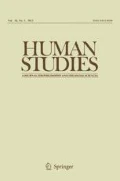Abstract
This paper examines the discursive construction of collective identity in several feminist organizations, as a way of shedding new light on the debate over “essentializing” or “totalizing” terms in contemporary feminist/postmodernist theory. We argue that while this debate is about language, it has remained largely untouched by the insights of a discursive approach. The latter as we take it up here treats language as irremediably “strategic” or “interested.” In contrast, the feminist argument over essentializing terms appears to hold to a correspondence version of language, a position which limits the debate in fatal ways. Part 1 reviews the argument that terms such as “women”, “feminist” and “feminist identity” are essentializing discourses which dominate by silencing difference. Part 2 then considers the way one such concept – feminist identity – is actually constructed and used in the routine talk of members of feminist organizations. In Part 3 we draw out the implications of a discursive approach to such terms for the feminist/postmodernist debate.
Similar content being viewed by others
References
Antaki, C. (1994). Explaining and Arguing: The Social Organization of Accounts. London, Thousand Oaks, New Delhi: Sage Publications.
Alcoff, L. (1988). Cultural/Feminism versus Post-Structuralist Feminism: The Identity Crisis in Feminist Theory. Signs13(3): 405-436.
Belenky, M.F., McVicker Clinchy, B., Rule Goldberger, N. and Mattuck Tarule, J. (1986). Women's Ways of Knowing: The Development of Self, Voice and Mind. New York: Basic Books.
Bordo, S. (1990). Feminism, Postmodernism and Gender Scepticism. In L. Nicholson (Ed.), Feminism/Postmodernism. New York and London: Routledge.
Butler, J. (1990). Gender Trouble, Feminist Theory, and Psychoanalytic Discourse. In L. Nicholson (Ed.), Feminism/Postmodernism. New York and London: Routledge.
Butler, J. and Scott, J.W. (Eds.). (1992). Feminists Theorize the Political. New York: Routledge.
Blum, A. and McHugh, P. (1983). Self-Reflection in the Arts and Sciences. Atlantic Highlands, New Jersey: Humanities Press.
Coles, R. (1991). Foucault's Dialogical Artistic Ethos. Theory, Culture and Society8: 99-120.
Davies, B. (1989). Frogs and Snails and Feminists Tales: Preschool Children and Gender. Sydney: Allen and Unwin.
de Certeau, M. (1984). The Practice of Everyday Life. Berkeley and Los Angeles: University of California Press.
Flax, J. (1992). The End of Innocence. In J. Butler and J.W. Scott (Eds.), Feminists Theorize the Political. New York: Routledge.
Garfinkel, H. (1967). Studies in Ethnomethodology. Englewood Cliffs, New Jersey: Prentice-Hall.
Gilligan, C. (1982). In a Different Voice. Cambridge, Massachusetts: Harvard University Press.
Grossberg, L., Nelson, C. and Treichler, P. (Eds.). (1992). Cultural Studies. New York: Routledge; London: Chapman and Hall.
Hartsock, N. (1990). Foucault on Power: A Theory For Women?. In L. Nicholson (Ed.), Feminism/Postmodernism. New York and London: Routledge.
Holstein, J.A. (1987). Producing Gender Effects on Involuntary Mental Hospitalization. Social Problems34: 1441-1455.
Holstein, J.A. and Gubrium, J. (1995). Deprivatization and the Construction of Domestic Life. Journal of Marriage and the Family57: 894-908.
Holstein, J.A. (1994). Phenomenology, Ethnomethodology and Interpretive Practice. In N. Denzin and Y. Lincoln (Eds.), Handbook of Qualitanve Research. London, Sage Publications Ltd.
Holstein, J.A. and Miller, G. (Eds.). (1993). Reconsidering Social Constructionism: Debates in Social Problems Theory. New York: Aldine de Gruyter.
Houston, M. and Kramarae, C. (Eds.). (1991). Women Speaking from Silence. (Special Issue of Discourse and Society, Vol. 2).
Kitzinger, C. (1987). The Social Construction of Lesbianism. London: Sage Publications Ltd.
Lakoff, R.T. (1990). Talking Power: The Politics of Language. New York: Basic Books.
Melucci, A. (1989). Nomads of the Present: Social Movements and Individual Needs in Contemporary Society. Philadelphia: Temple University Press.
Melucci, A. (1992). Liberation or Meaning? Social Movements, Culture and Democracy. Development & Change23(3): 43-77.
Metcalfe, J.L. (1995). Negotiating Collective Identity in the Calgary Women's Movement: A New Social Movements Perspective. Unpublished M.A. Thesis. Canada: The University of Calgary, Calgary, Alberta.
Miller, G. (1991). Enforcing the Work Ethic. Albany, New York: SUNY Press.
Miller, L.J. (1993). Claims-making from the Underside: Marginalization and Social Problems Analysis. In J. Holstein and G. Miller (Eds.), Reconsidering Social Constructionism. Hawthorne, New York: Aldine de Gruyter.
Miller, L.J. (1990). Violent Families and the Rhetoric of Harmony. British Journal of Sociology41: 263-288.
Miller, L.J. and Penz, O. (1991). Talking Bodies: Female Bodybuilders Colonize a Male Preserve. Quest43: 148-163.
Riley, D. (1988). Am I That Name? Feminism and The Category of “Women” in History. London: Macmillan; Minneapolis: University of Minnesota Press.
Schultz, V. (1992). Women ‘Before’ the Law: Judicial Stories about Women, Work and Sex Segregation on the Job. In J. Butler and J.W. Scott (Eds.), Feminists Theorize the Political. New York: Routledge.
Smith, D.E. (1987). The Everyday World as Problematic: A Feminist Sociology. Toronto: University of Toronto Press.
Smith, D.E. (1997). Telling the Truth After Postmodernism. Symbolic Interaction19(3): 171- 202.
Spector, M. and Kitsuse, J.I. ([1977] 1987). Constructing Social Problems. Hawthorne, New York: Aldine de Gruyter.
Stenner, P. and Marshall, H. (1995). Critical Discourse Analysis? D and S Forum. Discourse and Society6(4): 568-570.
Squire, C. (1995). Pragmatism, Extravagance and Feminist Discourse Analysis. In S. Wilkinson and C. Kitzinger (Eds.), Feminism and Discourse. London, New Delhi, and Thousand Oaks, Cal.: Sage Publications.
Van Dijk, T.A. (1993). Principles of Critical Discourse Analysis. Discourse and Society4(2): 249-283.
Wetherell, M. (1995). Romantic Discourse and Feminist Analysis: Interrogating Investment, Power and Desire. In S. Wilkinson and C. Kitzinger (Eds.), Feminism and Discourse. London, New Delhi and Thousand Oaks, Cal.: Sage Publications.
Widdicombe, S. (1995). Identity, Politics and Talk: A Case for the Mundane and the Everyday. In S. Wilkinson and C. Kitzinger (Eds.), Feminism and Discourse. London, New Delhi and Thousand Oaks, Cal.: Sage Publications.
Rights and permissions
About this article
Cite this article
Miller, L.J., Metcalfe, J. Strategically Speaking: The Problem of Essentializing Terms in Feminist Theory and Feminist Organizational Talk. Human Studies 21, 235–257 (1998). https://doi.org/10.1023/A:1005379625641
Issue Date:
DOI: https://doi.org/10.1023/A:1005379625641




